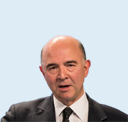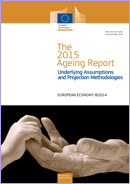|
|
|
|
|
|
 |
 |
 |
 |
2014 Autumn Economic forecast: Slow recovery with very low inflation
The European Commission’s autumn forecast, which was released on 4 November, projects weak economic growth for the rest of this year in both the EU and the euro area. Real GDP growth is expected to reach 1.3% in the EU and 0.8% in the euro area for 2014 as a whole. Growth is expected to rise slowly over the course of 2015, to 1.5% and 1.1% in the EU and euro area respectively, on the back of improving foreign and domestic demand. A strengthening financial sector (following the comprehensive assessment by the European Central Bank and further progress towards the Banking Union) is expected to drive an acceleration of economic activity to 2.0% and 1.7% respectively in 2016. This is also when the lagged impact of already implemented reforms should be felt more strongly. The employment situation will gradually improve, with the unemployment rate set to fall to 9.5% in the EU and 10.8% in the euro area in 2016. Inflation is expected to remain very low in 2014 and slowly increase through 2016 as economic activity gradually strengthens and wages rise.
|
 |
 |
 |
|
 |
 |
 |
 |
 |
|
 |
 |
 |
| There is no single, simple answer to the challenges facing the European economy. We need to act across three fronts: for credible fiscal policies, ambitious structural reforms and much-needed investment, both public and private. |
 |
Pierre Moscovici, Commissioner for Economic and Financial Affairs, Taxation and Customs
|
|
|
|
 |
 |
 |
 |
Ready to roll up their sleeves: New European Commission takes office on 1 November
The new European Commission has taken office under its new president, Jean-Claude Juncker. After the European Parliament gave its firm support to the new European Commission on 22 October, and the European Council appointed the new Commission on 23 October, the former Luxembourg Prime Minister and his team officially replaced his predecessor, José Manuel Barroso, and the Barroso Commission on 1 November. Mr. Juncker was elected by a large majority of the European Parliament on 15 July. He is supported by seven Vice-Presidents and 20 Commissioners. France’s Pierre Moscovici is the new Economy Commissioner responsible for economic and financial affairs, taxation and customs, Valdis Dombrovskis of Latvia is Vice-President for the Euro and Social Dialogue and Jyrki Katainen of Finland is now Vice-President in charge of the portfolio for jobs, growth, investment and competitiveness. Juncker has stated that one of his Commission's highest priorities will be creating jobs and he has pledged to begin implementing a EUR 300 billion stimulus package by the end of the year. The new Commission’s term of office runs until 31 October 2019. Upon taking office, Juncker said: “Europe's challenges cannot wait. As of today, my team and I will work hard to deliver Europe the new start we have promised.”
|
 |
|
 |
 |
|
 |
 |
 |
 |
Portugal post-programme surveillance: economic and financial conditions improved but pace of structural reforms slowing
Staff teams from the European Commission and the European Central Bank visited Portugal from 28 October through 4 November to conduct a first post-programme surveillance mission. This was coordinated with the International Monetary Fund’s first post-programme monitoring mission. Staff from the European Stability Mechanism (ESM) also participated in the mission on aspects related to the ESM’s Early Warning System. Economic and financial conditions in Portugal have generally improved since the end of the EU/IMF-supported programme in June. Sovereign yields remain low, and normal market financing is gradually being restored. Nevertheless, economic recovery is constrained by high levels of debt in the public and private sectors and by an increasingly weak external environment. The latter shows the need to further increase competitiveness. Efforts to reduce the underlying structural budget deficit have slackened, as has the pace of structural reform, with past achievements being reversed in some cases. The next PPS mission will take place in spring 2015.
|
 |
|
 |
 |
|
 |
 |
 |
 |
Single Supervisory Mechanism for euro area banks begins
The Single Supervisory Mechanism (SSM), an essential component of the Banking Union, officially started on 4 November. The European Central Bank (ECB) now acts as the central prudential supervisor of financial institutions in the euro area, responsible for the supervision of some 3 600 banks (directly and indirectly) and in non-euro EU countries that choose to join the SSM. While the ECB will now directly supervise the 120 most significant banks, national supervisors will continue to monitor the remaining banks. The main task of the ECB and the national supervisors, working closely together, will be to check that banks comply with EU banking rules and to tackle problems early on. In a hearing with members of the European Parliament’s Economic and Monetary Affairs Committee the day before the SSM started, Danièle Nouy, chair of the ECB Supervisory Board and Single Supervisory Mechanism warned against complacency and listed the work that remains: recapitalising banks, establishing a borrowing capacity for the Single Resolution Fund, and creating a truly level playing field for all financial institutions within the EU. Commissioner Jonathan Hill on 4 November welcomed this step towards a fully operational banking union.
|
 |
|
 |
 |
|
 |
 |
 |
 |
Economic Sentiment picks up in both the euro area and the EU
According to data released on 30 October, in October, after four months of stagnation or decline, the Economic Sentiment Indicator (ESI) picked up in both the euro area (by 0.8 points to 100.7) and the EU (by 0.5 points to 104.0). The euro-area indicator thereby went back to just above its long-term average of 100. The stabilisation of euro-area sentiment resulted from an improvement in confidence in all business sectors. While rises were important in retail trade, services and, particularly, construction, industry booked only a small increase, and confidence among consumers remained broadly stable. Amongst the largest euro-area economies, the ESI decreased only in Spain (-0.7), while it rose in Germany (+0.6), France (+1.1), Italy (+0.5) and the Netherlands (+2.1). The smaller increase in the headline indicator for the EU (+0.5) was mainly due to deterioration in the largest non-euro area EU economy, the UK (-2.1). However, the ESI increased markedly in Poland (+2.9).
|
 |
|
 |
 |
|
 |
 |
 |
 |
“Do some EU member states need more budget flexibility?” “Real Economy” episode on Euronews asks the question
Some large countries believe Europe is seeing weakened demand, and annual budget cuts are making things worse. But other large countries with more balanced budgets – or even a budget surplus – think that relaxing budgetary discipline to stimulate economic growth just reduces pressure on governments to reform. A “Real Economy” episode on Euronews asks what lies behind the push for budgetary flexibility by some countries. In the show, Guntram Wolff, Director of Bruegel, notes the successes of more flexible fiscal policy stances in the US and, more controversially, in Japan, where policy success has been limited to boosting inflation and inflation expectations, while Thomas Wieser, President of the Euro Working Group, argues for no relaxation of the current fiscal rules as enshrined in the Stability and Growth Pact (SGP) and Fiscal Compact. Several Italian business leaders including Andrea Tomat, President and CEO of Lotto Sport, also appear on the show and argue for responsible investment. “Real Economy” is designed to bring the complexities of economic matters in the EU closer to Euronews’ daily audience of 6.5 million viewers. Besides watching it directly on TV, viewers can also follow it online – live or on demand.
|
 |
|
 |
 |
|
 |
 |
 |
 |
Last chance to visit it! Euro exhibition opens in Wrocław, Poland
Building on its success over the last two years, the travelling euro exhibition arrived in Wrocław, Poland this week. On 5 November, Małgorzata Zaleska, Member of the Management Board of the National Bank of Poland (NBP) and Natalia Szczucka – Head of the EC Regional Representation in Poland opened the exhibition which takes visitors on the road to the euro around two exhibition areas. After presenting EU countries and the main historic steps that led to the adoption of the euro, it focuses on the Economic and Monetary Union and also addresses topical issues, such as the EU response to the sovereign debt crisis and the new EU economic governance framework. The exhibition will stay in Wrocław through 4 December. This is the final stop of the exhibition and hence your last opportunity to visit it.
|
 |
|
 |
 |
|
|
|
|
 |
 |
 |
 |
The 2015 Ageing Report: Underlying Assumptions and Projection Methodologies. European Economy 8/2014.
In 2012, the ECOFIN Council asked the Economic Policy Committee (EPC) to update its age-related expenditure projections by the autumn of 2014, to take into account new population projections by Eurostat. This report, the first of two, describes the underlying macroeconomic assumptions and projection methodologies for all Member States. A second report, to be presented to the ECOFIN Council in May 2015, will draw on this analysis to calculate the age-related expenditures associated with pensions, health care, long-term care, education and unemployment transfers. The long-term, age-related expenditure projections will provide an indication of the timing and scale of the potential economic effects to be expected as Europe’s population ages, providing insight on both the economic impact of ageing and the risks to the long-term sustainability of Member States’ public finances.
|
|
 |
|
|
|
|

|

|
Autumn 2014 European Economic Forecast infographic
|

|

|

|

|

|
DG ECFIN produces economic forecasts on behalf of the Commission. They serve as a basis for various economic surveillance procedures, such as in the context of the European Semester.
|

|

|
|
|
|
|
|
|
|
|
|
|
|
|
|
|
 |
| Directorate-General for Economic and Financial Affairs |
 |
|